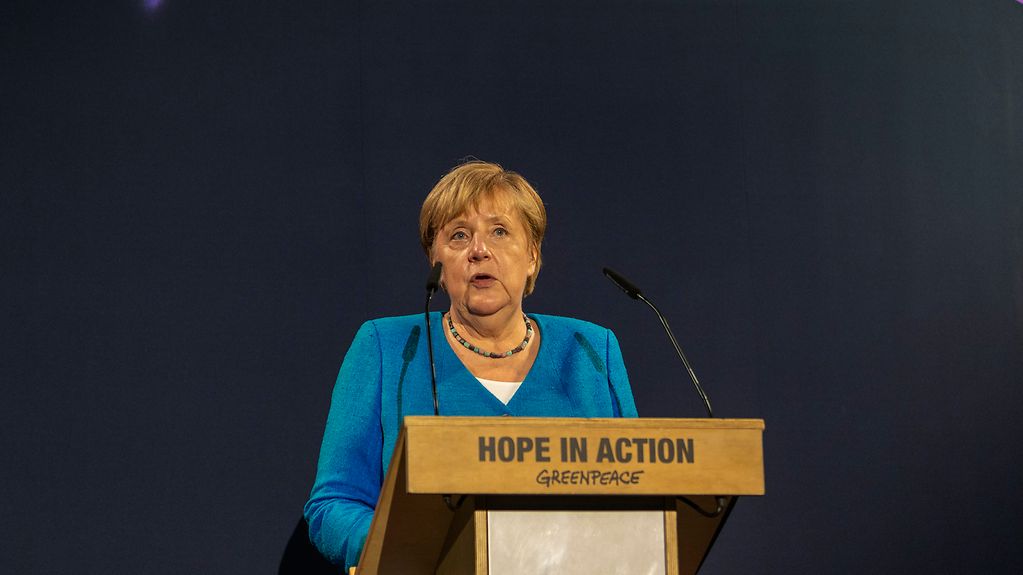Federal Chancellor attends Greenpeace anniversary event
The environmental organisation Greenpeace celebrated its 50th anniversary. Federal Chancellor Merkel went to the Ozeaneum maritime museum in Stralsund to attend the festivities and offer her congratulations. The work of the organisation contributed “to the goal of addressing what was potentially the central challenge of our time: climate change”, said Merkel.
4 Min. Lesedauer

Federal Chancellor Merkel in Stralsund: the event took place at the Ozeaneum maritime museum on the Baltic Sea.
Foto: Federal Government/Köhler
“For 50 years, Greenpeace has been persistent, combative, steadfast and persuasive in its efforts to draw attention to the vulnerability of the oceans, the atmosphere and the natural environment, as well as their importance to us humans,” stressed Federal Chancellor Merkel in her speech at the “50 Years of Greenpeace” event. There are many things that would never have been set in motion without the efforts of Greenpeace, said the Federal Chancellor.
The history of the environmental protection organisation was inextricably linked to the protection of the oceans, she noted. Merkel recalled the organisation’s first protests in 1971 against American nuclear bomb testing off Alaska and its campaigns to protect whales. When Greenpeace was originally founded in Germany in 1980, it was the protection of the oceans that served as the initial impulse – in protest against the dumping of dilute acid in the North Sea.
Contribution to environmental awareness
“The list of Greenpeace’s campaigns to draw the world’s attention to ecological and humanitarian grievances is long. This has meant that Greenpeace hasn’t only made friends – as the obstruction and persecution of activists in many countries has shown over and over again,” said Merkel.
She stressed that the organisation’s achievements demonstrated “that social commitment really is worthwhile,” but she also mentioned the “failed paragliding campaign” at the European Football Championship in June this year. Here it had been important for the organisation to express its regret afterwards, she said.
Climate change as a national, European and global task
The work done by Greenpeace contributed “to the goal of addressing what was potentially the central challenge of our time: climate change,” said Merkel. “Climate change must be curbed for the sake of our children and grandchildren. This is a task facing all of us at the national, European and global level. It requires a fundamental change of mindset towards greater sustainability in the way we live, work and do business. At home and around the world.”
Such a transformation involved effort and expense, she said, adding that the consequences of climate change would be even more dramatic and less manageable “if we do too little or act even later than is already the case”. The price to pay here would be considerably higher than that of timely countermeasures, said Merkel, “both from the point of view of the financial cost and in terms of loss of habitats and the natural environment.” As examples, Merkel mentioned the cost of the coal phase-out amounting to 40 billion euros and the flood relief fund with a budget of 30 billion euros.
Reducing greenhouse gas emissions – achieving climate neutrality
Justice between the generations was the underlying principle of the climate ruling issued by the Federal Constitutional Court in March this year: one of its key statements is that climate protection efforts must be shared fairly between the generations. “This is one of the reasons why the Federal Government implemented this decision as swiftly as possible by enshrining even more ambitious climate protection targets in the Climate Protection Act. According to this, greenhouse gas emissions are to be reduced by at least 65 percent by 2030, while the goal of climate neutrality is to be achieved as early as 2045.”
The EU had also presented comprehensive legislative proposals with a view to achieving climate neutrality, said Merkel. “In-depth consultations on this are now scheduled for the autumn,” said the Federal Chancellor. Ultimately, however, climate protection could only succeed on a global scale, she added: “Without multilateral action, little or nothing will have any effect.”
Greenpeace is one of the biggest environmental organisations in the world. With its headquarters in Amsterdam, it claims to have around three million supporters worldwide and more than 600,000 supporting members in Germany.
In the 1980s and 1990s, Greenpeace mainly made headlines with its elaborate and sometimes risky campaigns. It came to international prominence with its fight to stop the sinking of the floating oil storage facility Brent Spar, as well as its campaign for pollutant-free refrigerators. The operations of the Greenpeace ship Rainbow Warrior likewise attracted international attention with its combative efforts to put an end to the processing of nuclear waste, the killing of baby seals, whaling and French nuclear testing.